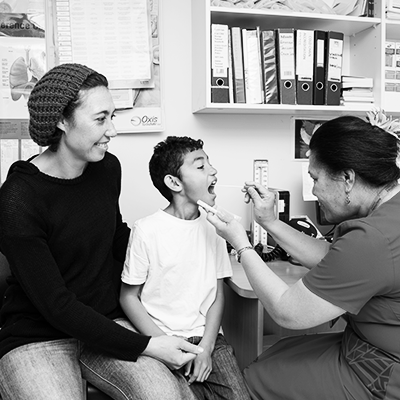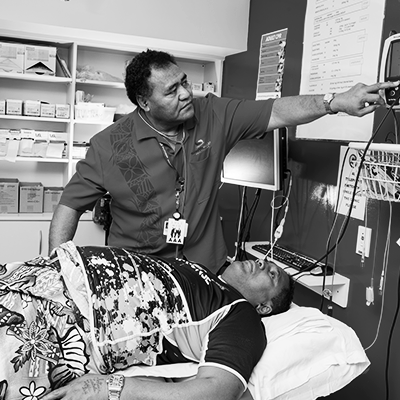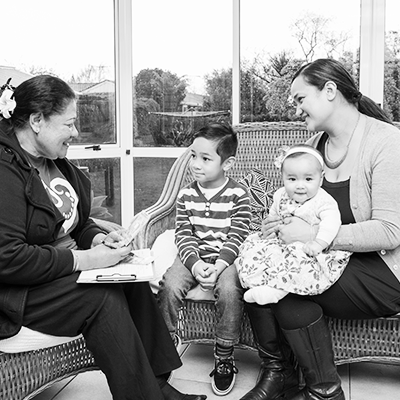Rheumatic Fever mostly affects our Pasifika children aged 4 – 19 years old.
But it can be prevented – if you or your child has a sore throat, get it checked and get it treated.



Learn More
Rheumatic Fever
What is Rheumatic Fever?
Rheumatic fever is an autoimmune disease which can be caused by untreated strep throat. It happens when your immune system makes a mistake and attacks other parts of your body, as well as the strep throat germs.
Rheumatic fever is a serious illness that can cause damage in your heart as well as swelling and pain in your hips, knees, ankles, elbows, and wrists. You may also notice a skin rash, fever, or jerky movements. Over time, most of these symptoms will go away but any damage to your heart may be permanent.
A strep throat infection can lead to rheumatic fever, even if it's the first time or a one-off. The risk of getting rheumatic fever gets higher when someone has repeated untreated strep throat infections.
What are some of the key signs of Rheumatic Fever?
Untreated sore throats, caused by strep throat, can lead to Rheumatic Fever. Symptoms of Rheumatic Fever include sore joints, shortness of breath, a skin rash, fever and / or jerky movements. Over time, most of these symptoms will go away, but any damage to your or your child’s heart may be permanent.
I’ve heard people talk about sore throats and Rheumatic Fever – why is that?
Most sore throats get better on their own after about four days. But if strep throat – a throat infection caused by a bacteria called Group A Streptococcus – is not treated with antibiotics, it can cause Rheumatic Fever in children and young people.
Am I at risk of developing Rheumatic Fever?
Rheumatic Fever disproportionately affects Pacific children aged between 4 – 19 years old. If your or your child is Pacific, aged between 4 and 19 years and has a sore throat, please get it checked at the school nurse or family doctor straight away.
Don’t wait to see if your child’s throat gets better. Strep throat needs to be treated immediately. Treating sore throats early can stop rheumatic fever from developing.
Getting tested
What happens if a sore throat doesn’t get treated?
The risk of getting rheumatic fever is higher when someone has repeated, untreated strep throat infections. While the symptoms of rheumatic fever may disappear on their own, the inflammation from even just one rheumatic fever attack can develop into rheumatic heart disease, where there is scarring of the heart valves. This is serious and can be life threatening. If rheumatic fever develops into rheumatic heart disease, it could cause serious heart problems, damaging your child’s heart forever. Your child may need heart surgery.
How do I get a sore throat tested?
All sore throats in Māori and Pacific children need to be checked at your GP or school health clinic. Swabbing only takes a few seconds.
A health care provider will have your child open their mouth as wide as possible. They'll press your child's tongue down with a flat stick (tongue depressor) to clearly examine the mouth and throat. Using a clean, soft cotton swab, they'll lightly brush over the back of the throat, around the tonsils, and over any red or sore areas to collect a sample.
Is the treatment for the sore throat easy?
If your child has strep throat, they will be given oral antibiotics for 10 days or a one-off penicillin injection to clear up the infection. It is important to take the oral antibiotics for the full 10 days, even if the sore throat feels better.
Getting well from Rheumatic Fever
How can Rheumatic Fever affect the heart?
The heart is a pump with 4 chambers (rooms) and 4 valves. A heart valve acts like a one-way door. It makes sure that blood pumped by the heart flows in one direction only. If rheumatic fever damages the heart valves, this is called rheumatic heart disease. When your doctor listens to your child's heart, they may hear extra sounds called murmurs. Murmurs are often normal in unwell children but sometimes they can be a sign that blood is flowing the wrong way through a leaky valve.
What happens in the hospital?
During your child's stay in hospital, they will have many tests. These include blood tests and an echo scan (echocardiogram) to check on your child's heart. The treatment for sore joints is rest and pain relief. Your child will have penicillin to get rid of the strep bacteria. They will have their first penicillin injection before leaving hospital. Depending on your child's symptoms and test results, they may need to stay resting in hospital for some weeks or months. Children with badly damaged heart valves may need heart surgery.
What happens next?
It is very important that your child doesn’t get Rheumatic Fever again. This can cause even more damage to their heart.
Your child will need a penicillin injection every 28 days, in a muscle near their bottom or hip.
Your child will need to have injections every 28 days for at least 10 years, or until they are 21 years old, whichever is longer. In some cases, particularly if your child has heart valve damage, they may need to continue penicillin injections for longer.
My child doesn’t feel sick – do they still need treatment?
Never stop penicillin treatment without discussing it first with your child's doctor, as your child could get rheumatic fever again. This can cause more damage to their heart valves. Remember to tell your child's nurse if you are moving house, going overseas, on holiday, or going away. Your child may need to get their injection early, or their nurse may be able to arrange for them to receive their injections elsewhere.
Are there any side effects to the treatment?
Penicillin injections can be painful. Nurses can use numbing medicine (local anaesthetic), distraction techniques and other ways to minimise the pain.
Like all medicines, benzathine penicillin can cause side effects, although not everyone gets them. Often side effects improve as your body gets used to the new medicine. Side effects can include fever, chills headache or fatigue, diarrhoea or nausea. A trained healthcare professional will observe you for at least 15 minutes after being given the injection. Tell your doctor / nurse if any of these symptoms are ongoing or troublesome.
How can I help prevent my family from getting sick?
Get all sore throats checked and treated at your family doctor or school nurse. Strep throat is contagious and can be spread by breathing in droplets from an infected person's coughs and sneezes. It can also be spread through shared food or drinks.
Cover your mouth and nose with a tissue when you sneeze or cough. Avoid close physical contact such as kissing when you are sick, and don’t share eating or drinking utensils (eg, cups or knives and forks). Try to create space between your children when they sleep, to limit the chance of germs being spread through coughs and sneezes.
Keep your home warm and dry, and create as much space as possible to spread out around your home. Having more warm rooms and more sleeping spaces available means germs like strep throat are less likely to spread.
